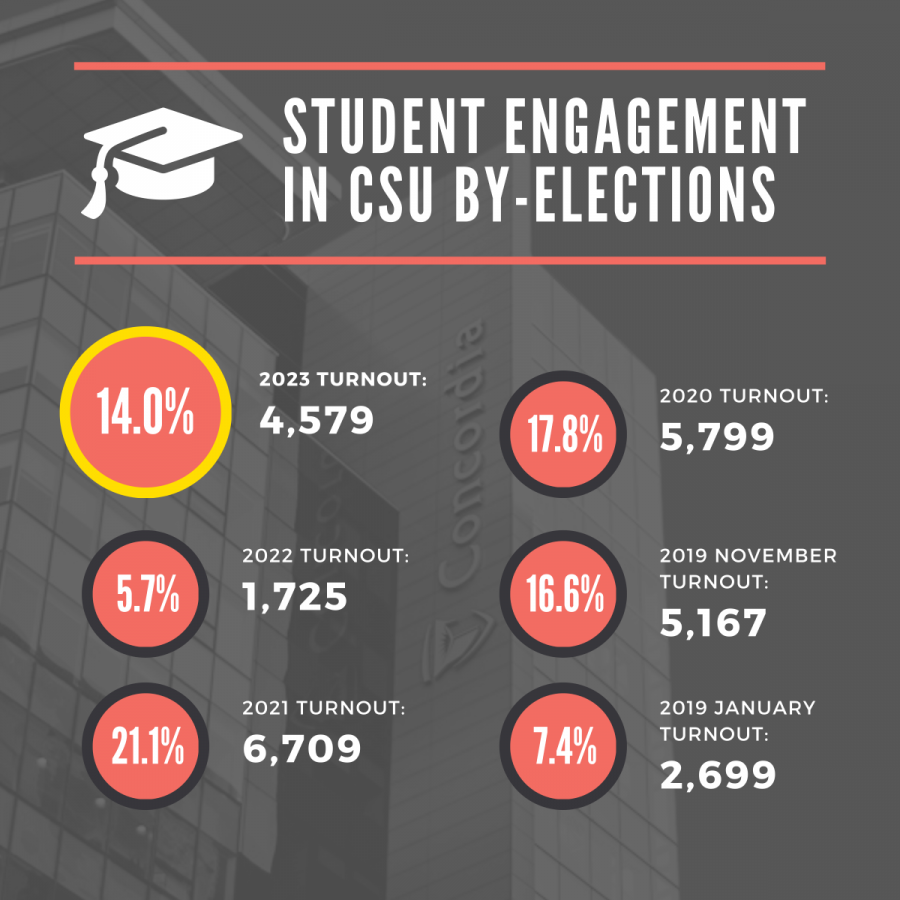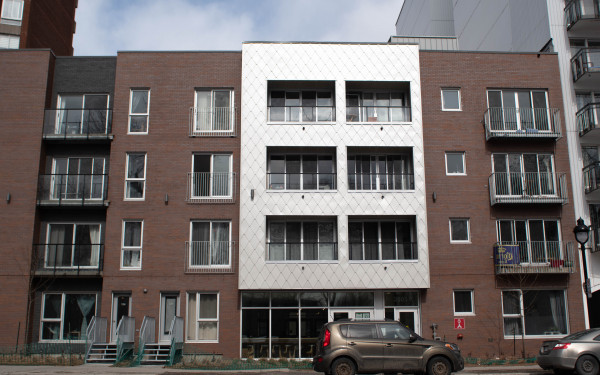Student engagement at the CSU remains low
Turnout for the CSU by-election was at 14 per cent and all five fee levy proposals were rejected amid a pending tuition doubling
The 2023 Concordia Student Union (CSU) fall by-election was called in response to 22 out of the 30 seats on the Council of Representatives being empty. The lack of student engagement has caused eight councilors to do the work of 30.
The CSU has additionally undergone a steady uphill battle to create engagement with student politics amidst a pending tuition hike which could existentially threaten Concordia University.
The upcoming tuition hike was the subject of the hour at the CSU’s public debate for the 2023 fall by-election.
Ryan Assaker ran for the arts and sciences seat—one of the eight allotted seats in the CSU council. To him, the goal was to create a common front with student unions at the francophone universities in Montreal.
“This tuition hike sets a precedent that can be used against other students in the future. We raised the prices for out-of-province students. Why not raise it for Quebec residents?” Assaker said. He was not elected.
Ikjot Singh, chief electoral officer at the CSU since 2022, said he wanted to “make student politics more accessible.” The CSU council has had to fight for student participation and engagement.
In an attempt to raise student engagement, Singh said he reintroduced the live CUTV YouTube broadcast of the by-election debate as well as in-person polling stations — previously interrupted due to quarantine measures in response to the COVID-19 pandemic. Singh said these policies have made the elections process more accessible, and there is an upward trend of candidates running, meaning every seat is likely to be filled.
Despite these efforts, only four out of 22 candidates showed up to the by-election public debate, which was the sole opportunity for the student body to meet the candidates before voting. The audience was composed of student journalists and a handful of the candidates’ friends. Passersby and students working at their computers in the seventh floor lounge hardly put down their belongings to listen to the debate.
Singh explained how student involvement in student politics severely decreased during the pandemic, saying “It broke off the culture that gets passed down from one year to the next.” He added that before the pandemic older students would “show younger students the ropes.” Tabling events with merch giveaways—a key to getting the word out to students about the CSU—also ended.
Low student engagement can be a vicious cycle. “There are fewer people running, so fewer people have more responsibilities. Normally the count (total number of council seats to be filled) is 30 people, and if there are only ten, and you are one of those ten, it grinds you down. So, you leave [the council] as well,” Singh said.
The Council of Representatives is the key representative body for student interests at Concordia. The council oversees and directs a multi-million-dollar budget which provides funding for student services such as the health and dental plan, a housing and job resource centre (HOJO), and affordable or free food through The Hive Free Lunch program.
As student engagement is needed now more than ever, participation in student politics is low.
The 2023 fall by-election garnered a voter turnout of 4,579 students, 14 per cent of the undergraduate student body. Although it is triple what it was last year, the number remains low. In previous years, since quarantine measures were lifted in response to the COVID-19 pandemic, voter turnout in the CSU by-elections fell from 21.1 per cent in 2021 to 5.7 per cent in 2022.
During the fall by-election, undergraduate students were urged to vote ‘yes', ‘no’ or ‘abstain’ for prospective student councillors and on five fee levies—which would increase individual tuition by cents based on the amount of credits one is taking. If passed, a fee-levy grants more funding to independent Concordia organizations and associations.
For the first time since 2019, all five fee-levies were rejected; they were the CSU Clubs Department, HOJO, Sustainable Concordia, Concordia Global Affairs Association and The Link Newspaper.
Adam Mills is one of the few councillors who has stuck it out at the council despite the mounting workload. Studying part-time this semester, now has 12 committee assignments, an informal record, when normally a councillor might have three or four.
For Mills, student engagement is a key battle that, “determines the legitimacy of the CSU in the university administration’s eyes. If everybody does their little part then [I don’t] have to be on 12 committees,” he said.
This article originally appeared in Volume 44, Issue 6, published November 14, 2023.




__600_375_90_s_c1.jpg)
